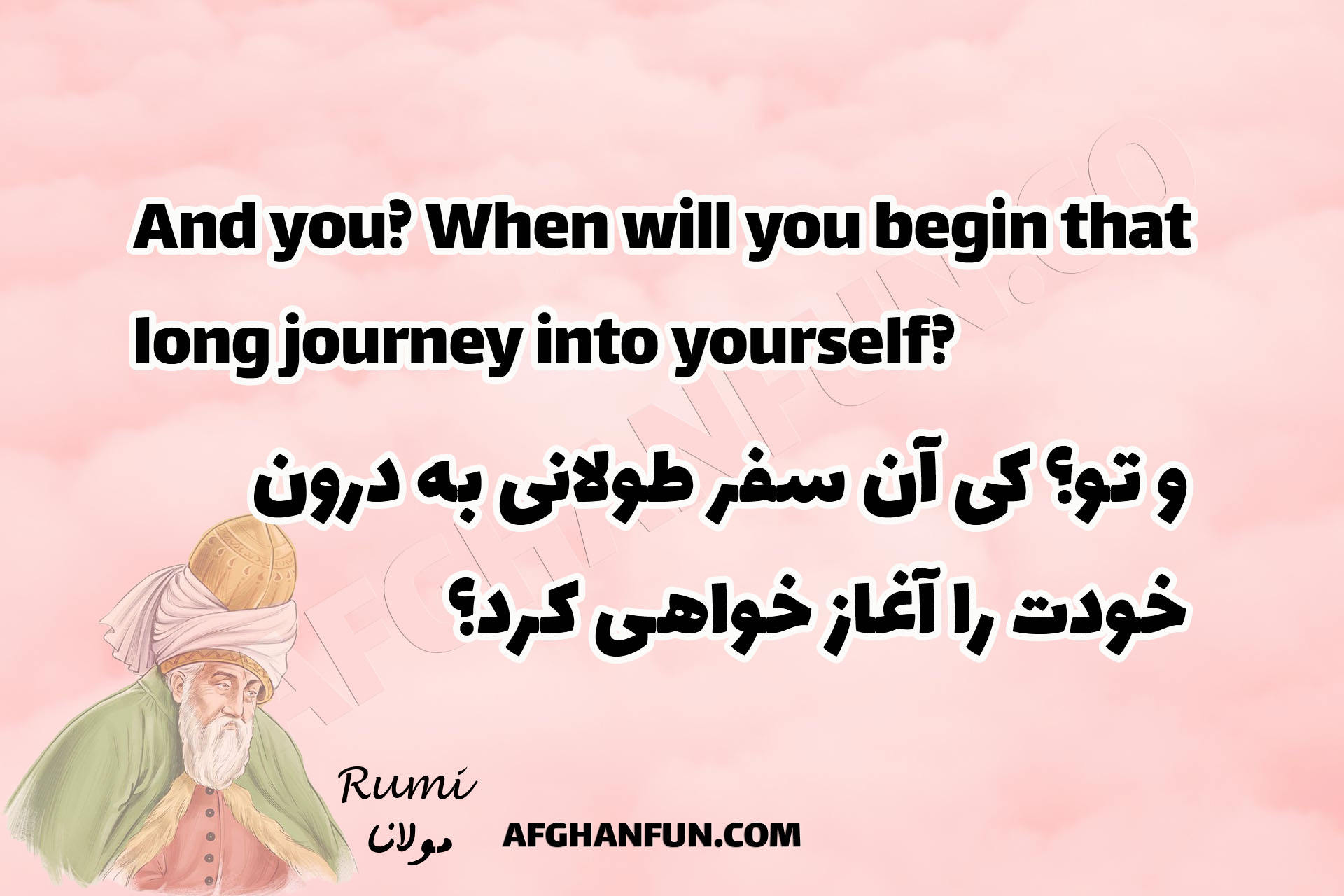Begin the Journey Into Yourself: Rumi’s Powerful Message
And you?
Rumi
When will you begin that long journey into yourself?
Unlock Your Inner Self with Rumi’s Life-Changing Quote
و تو؟
مولانا
کی آن سفر طولانی به درون خودت را آغاز خواهی کرد؟
این جمله مولانا دعوتی است به تأمل درونی و خودشناسی. او از ما میپرسد که چه زمانی تصمیم میگیریم سفری عمیق به درون خود را آغاز کنیم تا از حقیقت وجودمان آگاه شویم. این سفر، راهی به سوی رشد معنوی و کشف اسرار درونی است.
The Spiritual Journey Within: Rumi’s Guide to Self-Discovery
ва ту?
МАВЛОНО ҶАЛОЛУДДИН МУҲАММАДИ БАЛХӢ
Кай он сафари дарози ба даруни худатро оғоз мекунӣ?
Ин сухани Мавлоно як даъват ба тафаккури дарунӣ ва худшиносӣ аст. Ӯ аз мо мепурсад, ки кай тасмим мегирем ба сафари амиқи ба даруни худ шурӯъ кунем, то аз ҳақиқати вуҷудамон огоҳ шавем. Ин сафар роҳест ба сӯи рушди маънавӣ ва кашфи сирри дарун.
Rumi’s Most Thought-Provoking Quote on Personal Growth
وأنت؟
مولانا جلال الدین محمد الرومي
متى ستبدأ تلك الرحلة الطويلة إلى داخلك؟
هذه العبارة من مولانا هي دعوة للتأمل الداخلي ومعرفة الذات. فهو يسألنا: متى نقرر أن نبدأ رحلة عميقة إلى داخلنا لنكتشف حقيقتنا؟ هذه الرحلة تمثل طريقًا للنمو الروحي واكتشاف الأسرار الداخلية.
This Rumi quote, “And you? When will you begin that long journey into yourself?” speaks directly to the process of self-discovery, spiritual awakening, and inner transformation. It is a call to action, urging the reader to embark on a deeper exploration of their true nature and purpose.
Let’s break it down:
1. “And you?”
- The use of “And you?” is direct and personal. It shifts the focus from a generalized message to a pointed inquiry directed at the reader. It’s as if Rumi, in a moment of intimate dialogue, is turning the question toward the individual. This makes the question not just rhetorical but a genuine invitation for self-reflection.
- The question invites introspection, prompting the reader to look within and consider their own life’s path. It suggests that the journey into the self is something personal, something that each person must actively engage in. Rumi is not asking “Have you already started?” but rather, “When will you begin?”—indicating that the journey is ongoing, open, and necessary.
2. “When will you begin”
- The verb “begin” suggests that the journey has not yet started or that it is still in its early stages. It’s a call to awaken, to start something important that has been put off or overlooked. The implication is that the time is now, or that waiting any longer may be a denial of the self’s deeper calling.
- There’s also a sense of urgency here, but not in a forceful or anxious way. Rumi is gently nudging the reader to understand that waiting indefinitely or delaying self-exploration is a form of spiritual stagnation. The question itself awakens a desire to move toward the inner life, to start the journey of inner discovery.
3. “That long journey”
- “Long” emphasizes the depth, duration, and potential challenge of the journey. It suggests that self-discovery is not a quick or easy path, but one that requires patience, persistence, and commitment. It is a lifelong process, one that unfolds gradually and often in unexpected ways.
- The “long journey” could also point to the journey of spiritual maturation. In many spiritual traditions, including Sufism, the path to enlightenment, self-realization, or union with the divine is understood as a progressive journey—a series of steps that move us closer to our essential nature. It is a pilgrimage of the soul.
4. “Into yourself”
- The phrase “into yourself” directs the journey inward, highlighting the importance of self-exploration rather than outward seeking. Rumi points out that the deepest truths are not found in external achievements or possessions but within our own hearts and minds.
- To “go into yourself” is to explore the layers of the inner world—our thoughts, emotions, fears, desires, and ultimately, our deepest essence or soul. It is an invitation to remove distractions, to look beyond surface appearances, and to confront the truth of who we really are.
- In the context of Rumi’s spiritual teachings, this journey is ultimately a return to the divine, for in Sufism, the self is understood as both a reflection of and a conduit to the divine. To journey “into yourself” is to discover the sacred within and to recognize that the divine is not external but immanent within the soul.
5. The Deeper Implications:
- This quote can also be seen as an implicit critique of external distractions. Often, people focus on the outer world—on achieving status, material success, or external validation—while neglecting the more important inner journey. Rumi suggests that no matter how much we accomplish externally, we will not find fulfillment or true peace until we turn inward.
- The “long journey” can also refer to the spiritual discipline that requires constant self-awareness and mindfulness. Self-discovery is not a one-time event but a continual process of peeling back layers and confronting our own truths, even the painful or hidden ones.
- Finally, Rumi’s question can be seen as an invitation to self-love and self-acceptance. The journey inward involves recognizing one’s own worth, embracing one’s flaws and gifts, and ultimately coming to terms with the deeper aspects of the self that are often overlooked or denied.
6. Sufi Context:
- Within Sufism, the journey into oneself is central to the path of fana (annihilation of the ego) and baqa (spiritual rebirth). The goal is to transcend the self-centered ego and realize the true self—one that is united with the divine. Rumi, as a Sufi mystic, is urging the reader to embark on this sacred inner pilgrimage, to dive deep into the soul and discover the oneness with God that lies there.
- Rumi’s own journey was one of deep inner transformation—moving from a learned scholar to a mystical poet—and this quote reflects that spiritual evolution. It is a reminder that self-realization and the divine are not to be found in the external world but within, in the heart of each person.
Conclusion:
Rumi’s question, “And you? When will you begin that long journey into yourself?” serves as both a challenge and an invitation. It calls for a deep commitment to self-exploration, spiritual growth, and the discovery of our true nature. The “long journey” refers to the lifelong process of confronting one’s inner world, understanding the nature of the self, and ultimately recognizing the divine essence that exists within us all. It’s a reminder that the path to enlightenment begins not in the world around us, but in the world within.
Rumi’s question implies that the time to start this journey is always now—because, ultimately, there is no end to the self-discovery; it is a journey that continues to unfold as long as we are open to it.
External links:
This Rumi quote, found on “Goodreads“











